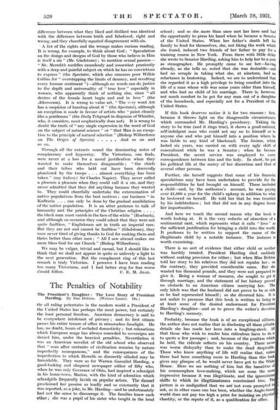The Penalties of Notability OF all ruling potentates in the
modem world a President of the United States has perhaps the most power, but certainly the least personal freedom. American democracy is said to be everywhere intolerant of privacy ; and its first citizen passes his entire tenure of office in remorseless limelight. He has, no doubt, hours of secluded domesticity ; but relaxations which European usage has always conceded to sovereigns are denied him, under the heaviest penalties. Nevertheless it was an American novelist of the old school who observed that "man after centuries of civilisation remains by nature imperfectly monogamous," and the consequences of the imperfection to which Howells so discreetly alluded may be formidable. They were so for Warren Gamaliel Harding, a good-looking and eloquent newspaper editor of fifty who, when he was only Governor of Ohio, had inspired a schoolgirl in his home-town, Marion, with the kind of adoration which schoolgirls frequently lavish on popular actors. The damsel proclaimed her passion so loudly and so constantly that it was reported, as a joke, to Mr. Harding—and he unfortunately had not the sense to discourage it The families knew each other; she was a pupil of his sister who taught in the local school ; and so she .more than once met her hero and had the opportunity to press his hand when he became a Senator of the United States. When her father's death left his family to fend for themselves, she, not liking the work which she found, induced two friends of her father to pay for a training course in New York. From there with little delay she wrote to Senator Harding, asking him to help her to a post as stenographer. He promptly came to see her—having already, as she tells us, noted that she was desirable—and had no scruple in taking what she, at nineteen, had no reluctance in bestowing. Indeed, we are to understand that she regarded it as a high privilege to bring comfort into the life of a man whose wife was some years older than himself, and who had no child of his marriage. There is, however, not much comfort to be got for any man out of a daughter of the horseleech, and especially not for a President of the United States.
If this book deserves notice it is .for two reasons: first, because it throws light on the disagreeable circumstances which surrounded Mr. Harding's presidency. Taking the story to be true (and it rings true), it shows a good-natured, self-indulgent man who could not say no to himself or to anyone else and who put himself into a position where he was liable to any kind of blackmail. The liaison, which lasted six years, was carried on with every ugly shift of concealment while he was a Senator ; when he became President, the secret service was employed to carry correspondence between him and the lady. In short, he put his political life at the mercy of her discretion and that of several other persons.
Further, she herself suggests that some of his financial speculations may have been undertaken to provide for the responsibilities he had brought on himself. These included a child—and, by. the authoress's account, he was paying over 21,000 a year for the child's upkeep in addition to what he bestowed on herself. He told her that he was troubled by his indebtedness ; but that did not in any degree lessen her importunities.
And here we touch the second reason why the book is worth looking at. It is the very reductio ad absurdum of a sentimental cant, which represents what it calls " love " as the sufficient justification for bringing a child into the world. It professes to be written to support the cause of the illegitimate child by a notable instance. The instance is worth examining.
There is no sort of evidence that either child or mother was harshly treated. President Harding died suddenly without making provision for either ; but when Miss Britton told her story to his relatives they did not repulse her ; on the contrary, they provided considerable sums. But she wanted ten thousand pounds, and they were not prepared to give it. Being a woman of resource, she sought to get it through marriage, and the statement of her history proved no obstacle to an American citizen marrying her. The only hitch was that the husband did not prove to be so rich as he had represented himself ; so she divorced him. It is not unfair to presume that this book is written to bring in at least some of the desired endowment for President Harding's daughter-Land so to prove the writer's devotion to Harding's memory.
Probably, because the book is of an exceptional silliness. the author does not realize that in disclosing all these, pitiable details she has made her hero into a laughing-stock. All that those who wish to render him ridiculous have to do is to quote a few passages ; and, because of the position which he held, the ridicule reflects on his country. There never was worse disloyalty than to make the dead despicable. Those who know anything of life will realize that, unless there had been something more in Harding than this book gives any glimpse of, he would never have got to the White House. Here we see nothing of him but the banalities of his commonplace love-making, which are none the more impressive because it was illegitimate, and the ignominious shifts to which its illegitimateness constrained him. The picture is so undignified that we are not even prompted ask, as in other cases one has been, whether the Anglo-Saxo world does not pay too high a price for insisting on physics chastity, or the repute of it, as a qualification for office.














































 Previous page
Previous page